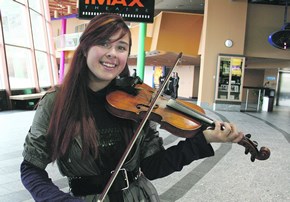BY
LAUREL MYERS
In August 2005, Hurricane Katrina devastated New Orleans. It
was the costliest and deadliest hurricane in the history of the
United States.
Amanda Shaw, a 17-year-old fiddling prodigy from the disaster
stricken city,  experienced the devastation and turmoil
the category five hurricane left in its wake.
Shaw was in Sudbury last Wednesday to share her emotional and
educational journey with an audience of high school students at
a special screening of Hurricane on the Bayou, on the IMAX
screen at Science North.
Featured in the film, Shaw shares her personal tale of
surviving Katrina and finding hope in the restoration of
Louisiana's wetlands.
"I didn't realize before (getting involved in the movie) how
important the wetlands are in keeping us safe from the power of
hurricanes," she said. "Now I understand that by saving the
wetlands, we can also save people. You can never be 100 percent
safe from storms... but a lot more of us could be protected if
we start rebuilding the marshes."
Hurricane on the Bayou takes viewers on a tour of the Louisiana
bayou and the city of New Orleans, where the region's wetlands
are eroding into the sea, leaving the entire region more
vulnerable to major hurricanes.
Original scripts for the movie were intended to show people the
wonders of the wetland and warn against the potential disasters
facing them. However, a few months into filming, the script
took a dramatic turn as Hurricane Katrina struck the set of the
film. Instead of acting as a warning, the film turned into an
emotional portrayal of New Orleans before and after the most
devastating natural disaster in American history.
"The hardest thing was not knowing what was going to happen
immediately after the storm and not knowing how your family is
or where they were," Shaw said. "Everything you knew changed
overnight. Your cell phone doesn't work, your credit cards
don't work and what you have on you is all you have. It's like
losing your identity."
Shaw and her family were able to evacuate the city. However,
her grandparents couldn't make it out. They lived in close
proximity to one of the city's levees, and with all
communication down, the Shaws were left speculating about their
safety. It took a month to be reunited with family.
"It was hard just sitting there, not knowing and not being able
to help," the young fiddler said.
With billions of dollars of damage done to the city, citizens
are still dealing with the aftermath of Hurricane Katrina.
"I think we are still very much in the middle of it," Shaw
said. "It'll be interesting to see how people feel in five
years, because right now, I think we're all just focused on
getting our lives back."
She explained the process of rebuilding is a slow one with
everybody requiring the same services at the same time.
"It's a year's wait just to get our electricity checked," she
said.
Shaw is on a mission to spread the word about the importance
of  reducing and repairing damage to the wetlands.
"There's a lot of different work being done," she said. "A lot
of people are traveling out to see if there's different kinds
of levees we can build that will help put the soil back where
it needs to go so it can naturally rebuild the wetlands."
She applauded Sudbury for the work they have done in regreening
the community.
"I think you guys have done a whole lot of work in helping to
rebuild the environment around here. I think that's awesome and
it's what New Orleans needs to do now."
When asked what can be done from Northern Ontario to help New
Orleans, Shaw extended an invitation to the students to come to
her hometown and witness the devastation first hand.
"The best thing you can do if you want to help out is come down
to New Orleans and see what's been done, all the problems that
we still have, go shop at local shops and eat at local
restaurants and you're putting money back into the people's
hands," she said.  "The first step to getting involved is
understanding what the problem is."
Hurricane on the Bayou is now playing in the Science North IMAX
theatre daily at 2 pm, with additional showings at 8 pm,
Thursday through Sunday.
For more information or to donate to the organizations offering
relief to the Katrina victims, go online at
www.hurricaneonthebayou.com
Join Sudbury.com+
- Messages
- Post a Listing
- Your Listings
- Your Profile
- Your Subscriptions
- Your Likes
- Your Business
- Support Local News
- Payment History
Sudbury.com+ members
Already a +member?
Not a +member?
Sign up for a Sudbury.com+ account for instant access to upcoming contests, local offers, auctions and so much more.
